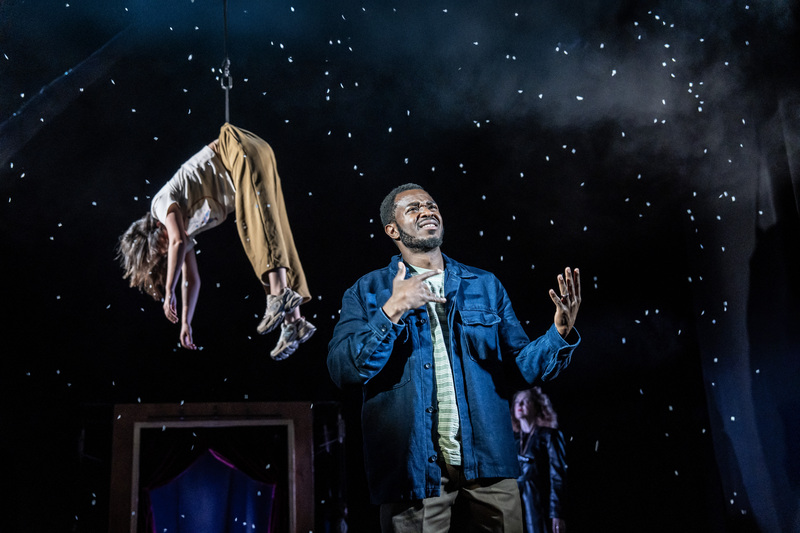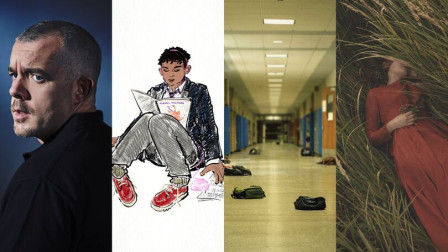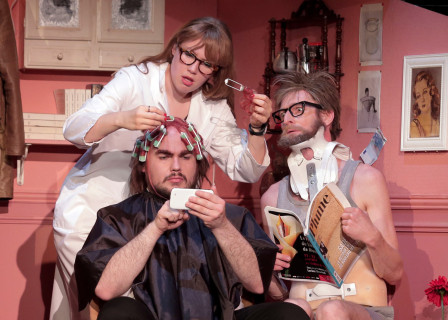Review: DEAF REPUBLIC at Royal Court Theatre
Dublin-based theatre company Dead Centre led by artistic directors Ben Kidd and Bush Moukarzel have joined forces with Zoë McWhinney to adapt the poetry of Odessa-born Ukrainian-America author, Ilya Kaminsky. The result is this stage production of DEAF REPUBLIC, which currently plays at the Royal Court.
 Caoimhe Coburn Gray and Romel Belcher in Royal Court Theatre. Photo by Johan Persson.
Caoimhe Coburn Gray and Romel Belcher in Royal Court Theatre. Photo by Johan Persson.
Firstly, there’s a great deal to unpack in the style and delivery of the piece, so let’s start with the story’s premise. Essentially, we are in a town named Vasenka which is under some kind of brutal military occupation. Gatherings are forbidden, so when a crowd collects in the town square to watch an innocent puppet show, a gun-toting soldier quickly appears in a combat jeep. Amidst the barked commands to disperse, a young unmoving deaf boy Petya, is deemed to have disobeyed the instruction and is shot dead. The town is horrified and citizens assume a collective deafness in honour of the boy’s sacrifice and as a form of non-violent, collective resistance. This causes untold frustration to the occupying forces, represented by the same soldier who is despatched multiple times through various means, by the townsfolk, including two women forced into prostitution.
The involvement of Dead Centre in this joint production, means that the collaboration is delivered in as accessible and inclusive way as possible. In practical terms this means that scenes include spoken English, silence, creative captioning and British Sign Language. Their inclusion is introduced with wit and humour in an opening sequence presented by Romel Belcher and Caoimhe Coburn Gray, in which they sign, speak and cause surtitles to appear on a suspended screen above their heads.
The puppet show itself acts as a wider metaphor for the country under occupation, with a gauze cyc frequently lowered at the proscenium arch onto which the puppet scenes are relayed (neatly allowing set pieces to be prepared behind). Despite the measured pace to proceedings, one gets a sense of technical jeopardy throughout the show, but the piece has clearly been rehearsed many times and is largely seamless in its tricksy transitions.
Thrown into the mix are late night abductions, acrobatic turns, a nude bath scene and other elements which aim to convey both the normality and weirdness of the situation faced by Vasenka’s population and those who would subjugate it. The end result is a thorough mishmash of concerning and thought-provoking ideas, delivered by a committed and confident group of theatre creatives. Is it entertaining? Yes, in many respects, but not to the degree that you would rave about it as a “must see”. This is well-meaning, inclusive theatre in all its earnestness — cerebral, hard-hitting and occasionally shocking. But that doesn’t mean I would necessarily subject my child or grandmother to it.
Deaf Republic plays at Royal Court Theatre until 13 September
Latest News

 Further cast announced for UK and Ireland tour of Annie
29 January 2026 at 15:10
Further cast announced for UK and Ireland tour of Annie
29 January 2026 at 15:10

 The Donmar Warehouse announces programme for 2026
29 January 2026 at 14:30
The Donmar Warehouse announces programme for 2026
29 January 2026 at 14:30

 Review: FISH BOWL at Peacock Theatre
29 January 2026 at 13:58
Review: FISH BOWL at Peacock Theatre
29 January 2026 at 13:58

 Regent's Park Open Air Theatre announces 2026 season
29 January 2026 at 10:34
Regent's Park Open Air Theatre announces 2026 season
29 January 2026 at 10:34